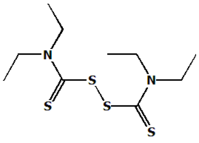Disulfiram Therapy in Alcoholism Disulfiram has been used for 40 years in the treatment of alcohol dependency dis-orders. The alcohol-aversive potential of disulfiram was first reported in 1937 by an occupational medicine physician who noted that workers who handled disulfiram, which is also an industrial chemical, manifested a distinct illness when they drank alcohol. Use of the drug was introduced into clinical practice on the basis of anecdotal reports, uncontrolled studies and case series.
Wright and Moore review the risks, benefits, indications and efficacy of this alcohol-aversive drug. Disulfiram is an inhibitor of aldehyde dehydrogenase, a necessary enzyme in the metabolism of ethanol. Persons who drink ethanol while taking disulfiram experience a highly unpleasant reaction, consisting of flushing, weakness, nausea and, occasionally, hypotension. Disulfiram will usually produce an aversive reaction to ethanol at a dosage between 250 and 500 mg per day. Cardiac, hepatic and neurologic toxicity can also occur within this dosage range.
Disulfiram is an adjunctive therapy that should be administered only in conjunction with behavioral and psychosocial therapies. The use of disulfiram in alcoholic patients who are not in a comprehensive treatment program will usually not lead to sustained abstinence.
Contraindications to disulfiram use are listed in the table. The drug should never be administered to intoxicated patients. Patients should understand the risks of drinking while taking disulfiram. The physician and patient must agree about the need for clinical supervision and monitoring for efficacy and side effects.
The authors believe that disulfiram may be most effective in reducing an alcoholic patent's ethanol consumption for a short period, such as when the patient is in a program of education, counseling and therapy. Disulfiram has no proven effect on the long-term outcome of alcoholism. (American Journal of Medicine, June 1990, vol. 88, p. 647.)
COPYRIGHT 1990 American Academy of Family Physicians
COPYRIGHT 2004 Gale Group



